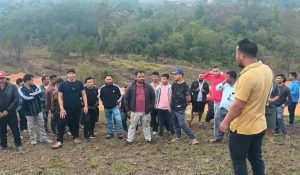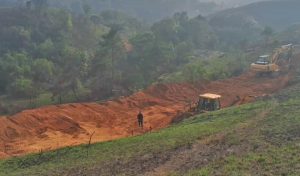Introduction: A Community’s Stand Against Unauthorized Industrialization
The peaceful village of Wapungskur in Meghalaya’s East Jaintia Hills District has found itself at the center of an industrial controversy. The Dorbar Shnong (traditional village council) has raised strong objections to the unauthorized construction of a Lam Coke Manufacturing Unit within its jurisdiction. According to the village authorities, Om Om Coke company initiated the project without seeking the village’s consent.
The villagers, deeply concerned about the environmental, health, and legal implications, have demanded an immediate cessation of all construction activities. The incident highlights a broader issue: the unchecked expansion of industrial projects in ecologically sensitive regions without proper approvals.
Discovery of the Unauthorized Coke Plant: A Shocking Revelation
On April 2, 2025, residents of Wapungskur noticed unusual activity in the area known as Thlukure Wah Tongtlang. Upon further investigation, the Dorbar Shnong discovered earth-cutting activities, signaling the early phases of industrial development.
What followed was an alarming revelation: the Om Om Coke company had begun construction of a coke manufacturing unit without securing permission from local authorities. This direct violation of local governance protocols angered the village leaders, prompting swift action.
Why the Village Opposes the Coke Plant: Environmental and Health Risks
The production of coke—a key industrial fuel—requires carbonization of coal, releasing harmful pollutants into the air and water. Such emissions pose severe risks, including:
- Air pollution: Release of toxic gases like sulfur dioxide and nitrogen oxides, leading to respiratory issues.
- Water contamination: Disposal of industrial waste can pollute local water sources, harming both human health and agriculture.
- Deforestation and land degradation: Industrial expansion often leads to large-scale deforestation, disrupting local ecosystems.
Wapungskur residents fear that these consequences will damage their environment, impact agriculture, and pose serious health risks for future generations.

Legal and Regulatory Violations: Ignoring Local Governance
Under Meghalaya’s local governance laws, any industrial project must seek approval from the Dorbar Shnong before proceeding. By bypassing this crucial step, the Om Om Coke company has violated regulatory norms and ignored community consent.
The establishment of industrial units without proper government clearance can lead to severe legal repercussions, including:
- Fines and penalties for violating land use regulations.
- Forced closure of operations due to non-compliance.
- Legal action from affected communities.
The Dorbar Shnong has made it clear that it will take strict action if the company fails to halt its activities immediately.


Government Intervention: A Call for Action
Wapungskur village leaders have urged the state government and environmental regulatory bodies to intervene. Their demands include:
1. Immediate inspection of the site to assess violations.
2. Issuing a cease-and-desist order to the company.
3. Ensuring compliance with environmental laws to prevent similar incidents in the future.
Community leaders emphasize that without government oversight, unauthorized industrialization will continue to threaten local ecosystems.
The Economic Impact: Balancing Development and Sustainability
While industrial projects can bring employment opportunities and economic growth, unauthorized developments often fail to benefit local communities. In many cases, villagers receive little to no compensation for land use, and the environmental damage far outweighs the financial gains.
Wapungskur residents are concerned that the coke plant will disrupt traditional livelihoods, including farming and local businesses. Without proper regulations, the economic benefits of industrialization may not trickle down to the local population.


Traditional Governance vs. Corporate Expansion: Upholding Indigenous Rights
Meghalaya has a strong tradition of local self-governance, where village councils play a crucial role in decision-making. The Dorbar Shnong system ensures that community interests are protected and that external influences do not exploit natural resources.
By opposing the unauthorized coke plant, the people of Wapungskur are asserting their right to self-determination, environmental protection, and sustainable development. This case highlights the ongoing struggle between traditional governance and corporate expansion in resource-rich regions.
What Happens Next? Ensuring Sustainable and Legal Industrial Development
Moving forward, Wapungskur’s stand against the coke plant serves as a wake-up call for policymakers, industrialists, and environmentalists. The following steps can help ensure a balanced approach to industrialization:
- Strict enforcement of land and environmental laws to prevent unauthorized projects.
- Stronger collaboration between communities and industries to ensure mutual benefits.
- Regular environmental impact assessments before approving large-scale industrial projects.
- Promotion of sustainable industries that align with local needs and ecological balance.
The people of Wapungskur are determined to fight for their land, environment, and rights. Whether through legal channels, community action, or government intervention, their message is clear: unauthorized industrial expansion will not be tolerated.
Conclusion: A Landmark Struggle for Environmental Justice
The protest against the unauthorized coke plant in Wapungskur is not just about one village—it is about protecting the environment, upholding community rights, and ensuring responsible industrial development.
This case serves as a reminder that local voices must be heard in matters of land use and industrial expansion. By standing together, communities can challenge corporate overreach and demand accountability from businesses and government bodies alike.
Final Thought:
For Meghalaya and other regions facing similar challenges, this incident highlights the need for a structured approach to development—one that respects local governance, prioritizes sustainability, and ensures that economic progress does not come at the cost of environmental and social well-being.
Read More: The villagers of Wapungskur remain steadfast in their demand for a halt to the unauthorized coke plant, emphasizing the need for sustainable industrial practices that respect local governance and environmental laws. As communities across the Northeast continue to protect their heritage, environmental resources, and traditional industries, significant developments such as Assam’s Axomiya Gohona earning a GI tag highlight the region’s rich cultural and economic contributions. To learn more about this recognition, visit this article.

